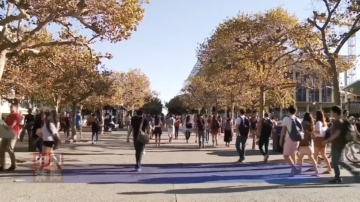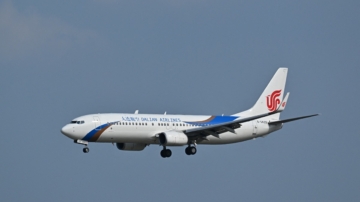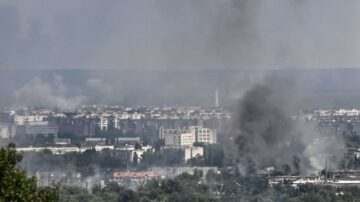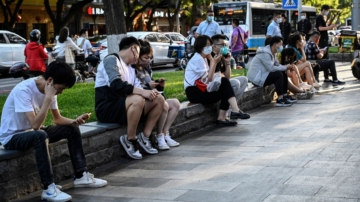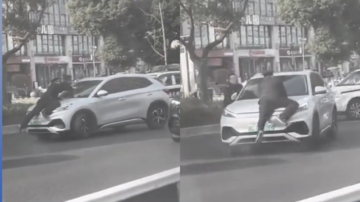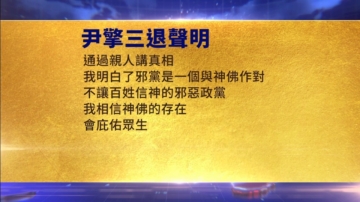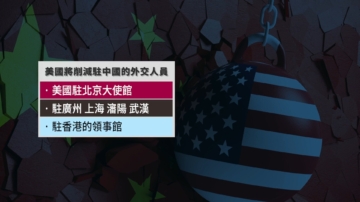【新唐人2014年02月18日訊】繼中共廣東東莞掃黃後,目前中國多地紛紛對各類娛樂場所進行了「突擊掃黃」,評論指出,中國的娛樂場所、酒店多由高官「參股」,警方做靠山,中共本意不在掃黃,而是以掃黃來轉移人們對前中共政法委書記周永康集團貪腐案的偵辦方向。
中國大陸媒體週日報導說,除廣東省外,全國共有8個省份至少9個城市,出動上千名警力對各類娛樂場所進行了「突擊檢查」,包括浙江杭州、甘肅蘭州、山東濟南、廣西柳州、黑龍江哈爾濱等。
北京時政觀察人士華頗分析,在中共高官持續落馬,周案即將公布的時刻,中共掀起這場全國性掃黃風暴,實際上是轉移偵辦周永康集團貪腐案的大方向。
華頗:「我覺得用掃黃來轉移人們對反腐的關注,所以我想首先是《央視》深入東莞,把鏡頭對準了黃、賭、毒的情況,其意圖還是黨內鬥爭的一種體現。以掃黃為突破口,來阻礙對既得利益集團的清洗,阻礙習、李的反腐行動。」
近兩個多月來,媒體密集放風,中共將公布周永康集團貪腐案。12號,有海外媒體引述消息說,新年前已有5800多人涉入周案,而且這一規模還在不斷擴大。
消息說,目前不少元老替涉及周案的高官向習近平求情﹔也有元老屢屢「提醒」,反腐應該注意策略和節奏,打擊面不能太大,更有人警告,官員財產公開不宜操之過急,「否則一定會引起巨大的社會混亂與動盪」等。
2月9號,《央視焦點訪談》播出暗訪東莞色情業的節目,當晚,當東莞出動近7000警力進行大掃黃。但大陸網民眾口一辭的對《央視》的暗訪表示鄙夷。隨後,中共黨媒《人民日報》發表系列評論,針對東莞掃黃引發的反彈進行指責。
華頗:「其實根本意圖就是中央某些人提出:現在的工作重點不是反腐,反腐應該結束了,重點應該是黃、賭、毒社會醜惡現象。我想各地方也就是一陣風的運動,來應付一下,我想這陣風一過還是一切如常。」
華頗披露,各類娛樂場所背後都有中共官員、和公安充當保護傘,當地的一部分經濟也靠小姐來支撐,所以這場掃黃不可能深入。
北京《經濟觀察報》引述一名東莞酒店業者的話表示,東莞的娛樂場所、酒店約3成股份是由高官暗地裡持有,警方也是色情業的靠山,不少高級警官都是酒店常客,藉此顯示「這裡很安全」,吸引客人。
曾在星級酒店做過收銀員的龐小姐對《新唐人》說,東莞實際上就是中國各地的翻版,幾乎每一個城市的星級酒店都有《央視》曝光的「莞式服務」。
原酒店收銀員龐小姐:「我家親戚前幾年在北京和深圳的五星級酒店都開過桑拿,我在那裡做過收銀員,去店裡的嫖客多是中共官員和警察,他們經常集體去嫖,嫖過之後由一個人去結帳,結過帳以後還要求店裡給他們開具餐飲的發票。」
16號,東莞4名鎮委書記就掃黃不力公開道歉說,他們「負有不可推卸的責任」。評論認為,這些地方官員更應該引咎辭職。
龐小姐:「08年我在深圳做收銀時,看到一個派出所長天天都到店裡嫖,但很少買單,老闆也沒意見,因為他給店裡帶來大量客源,而且每次要掃黃前,他都會事先通風報信,然後店裡讓小姐們穿戴整齊,做『正規』按摩,風頭一過再繼續營業。」
大陸業內人士說,東莞掃黃令色情產業鏈斷裂,20萬人需要另謀生計﹔有財政金融專家也分析,掃黃對東莞可能造成500億元人民幣的損失,即是東莞GDP的10%。
採訪編輯/李韻 後製/舒燦
CCP nationwide anti-vice crackdown diverts Zhou's case direction?
After the crackdown on prostitution in the southern Chinese
city of Dongguan, the Chinese regime has been carrying out
an "anti-vice campaign", with police raids targeting all kinds
of entertainment venues suspected to offer sex services.
Analysts say that with high ranked officials and the police
as major patrons of China's entertainment venues and hotels,
the CCP's aim isn't to end the sex trade but to take away
public focus from the corruption case involving ex-secretary
Zhou Yongkang of the Central Politics and Law Commission.
On Sunday, Chinese media reported that
in addition to Guangdong province, thousands of police
from at least nine cities including Hangzhou, Lanzhou, Jinan,
Liuzhou, Harbin and Shandong made a sudden visit
to many places of entertainment.
Beijing politics watcher Hua Po says the nationwide anti-vice
storm is an attempt to divert the investigation direction of
Zhou Yongkang's group corruption case with the time of CCP
officials' sacking and Zhou's case releasing.
Hua Po, Beijing politics watcher: "I think the anti-vice crusade
is to divert public attention on anti-corruption, and CCTV's
bringing attention to pornography, gambling, and drugs issues
in Dongguan is itself a reflection of the CCP's inner-Party struggles.
The anti-vice crackdown is to block
vested interest groups from being taken down,
and to block Xi and Li's anti-corruption campaign."
The past two months saw much media coverage
on the CCP's coming release of news
on the Zhou Yongkang group corruption case.
On Feb. 12, one media outlet quoted sources
who say Zhou's case involves nearly 6,000 people
and the scale is still expanding in the new year.
Many implicated senior officials are reportedly pleading to
Xi Jinping for protection; some reminded that anti-corruption
proceedings should be careful not to cause wide damage.
Some warn that information on officials' property
should not be released too hastily,
otherwise it will cause great social disorder and unrest, etc.
On Feb. 9, CCTV broadcast its undercover
investigation on the sex industry in Dongguan.
That evening, nearly 7,000 police were deployed
in an anti-vice sweep in Dongguan.
But many Chinese netizens were scornful
of CCTV's secret investigation.
Later, state media People's Daily published a series of
comments criticizing those against anti-vice sting in Dongguan.
Hua Po: "In fact, the basic intention is that some CCP officials
say that anti-corruption is no longer a focus and has been
dealt with by now; the current focus are social evils such as
pornography, gambling and drugs.
I think the local movement is just blowing hot air,
it will be business as usual after that."
Hua Po says the various entertainment venues are protected
under the umbrella of senior officials and police;
part of the local economy is supported by prostitution.
So it's impossible for the anti-vice sweep to be thorough.
Beijing Economic Observer quoted someone in Dongguan's
catering industry who says senior officials secretly hold
approximately 30% shares in Dongguan's entertainment and
hotels industry; police are also major sex industry patrons;
many senior police officers frequent some hotels to imply
"it's very safe here" and thus attract customers.
Former hotel clerk Ms. Pang told NTD that Dongguan
is no different from cities across the country,
as hotels in almost every city offer sex services.
Ms. Pang, hotel clerk: "One of my family members opened
five-star hotels in Beijing and Shenzhen few years ago and
I was a clerk at one.
Most clients are CCP officials and police.
They often go to prostitutes as group
and afterwards one of them would checkout for them
and request a catering invoice."
On Feb. 16, four Dongguan county secretaries apologized
publicly for ineffectively carrying out the anti-vice crackdown.
Commentators say these local officials should resign.
Ms. Pang: "When I was a clerk in Shenzhen in 2008, a police
station head had prostitutes every day and seldom paid for it.
My boss had no problem because
he brought a lot of customers to the store.
He also warned us before each anti-vice crackdown and our
hotel would dress up prostitutes as massage professionals.
They will continue after the anti-vice storm."
Mainland insiders say Dongguan's anti-vice crackdown
broke the porn industry chain with
20 million people looking for new livelihood.
Some financial experts also analyzed the anti-vice possibly
resulted in a 50 billion yuan ($8.2 billion) loss in Dongguan
which is 10% of the GDP.
Interview & Edit/LiYun Post-Production/ShuCan
中國大陸媒體週日報導說,除廣東省外,全國共有8個省份至少9個城市,出動上千名警力對各類娛樂場所進行了「突擊檢查」,包括浙江杭州、甘肅蘭州、山東濟南、廣西柳州、黑龍江哈爾濱等。
北京時政觀察人士華頗分析,在中共高官持續落馬,周案即將公布的時刻,中共掀起這場全國性掃黃風暴,實際上是轉移偵辦周永康集團貪腐案的大方向。
華頗:「我覺得用掃黃來轉移人們對反腐的關注,所以我想首先是《央視》深入東莞,把鏡頭對準了黃、賭、毒的情況,其意圖還是黨內鬥爭的一種體現。以掃黃為突破口,來阻礙對既得利益集團的清洗,阻礙習、李的反腐行動。」
近兩個多月來,媒體密集放風,中共將公布周永康集團貪腐案。12號,有海外媒體引述消息說,新年前已有5800多人涉入周案,而且這一規模還在不斷擴大。
消息說,目前不少元老替涉及周案的高官向習近平求情﹔也有元老屢屢「提醒」,反腐應該注意策略和節奏,打擊面不能太大,更有人警告,官員財產公開不宜操之過急,「否則一定會引起巨大的社會混亂與動盪」等。
2月9號,《央視焦點訪談》播出暗訪東莞色情業的節目,當晚,當東莞出動近7000警力進行大掃黃。但大陸網民眾口一辭的對《央視》的暗訪表示鄙夷。隨後,中共黨媒《人民日報》發表系列評論,針對東莞掃黃引發的反彈進行指責。
華頗:「其實根本意圖就是中央某些人提出:現在的工作重點不是反腐,反腐應該結束了,重點應該是黃、賭、毒社會醜惡現象。我想各地方也就是一陣風的運動,來應付一下,我想這陣風一過還是一切如常。」
華頗披露,各類娛樂場所背後都有中共官員、和公安充當保護傘,當地的一部分經濟也靠小姐來支撐,所以這場掃黃不可能深入。
北京《經濟觀察報》引述一名東莞酒店業者的話表示,東莞的娛樂場所、酒店約3成股份是由高官暗地裡持有,警方也是色情業的靠山,不少高級警官都是酒店常客,藉此顯示「這裡很安全」,吸引客人。
曾在星級酒店做過收銀員的龐小姐對《新唐人》說,東莞實際上就是中國各地的翻版,幾乎每一個城市的星級酒店都有《央視》曝光的「莞式服務」。
原酒店收銀員龐小姐:「我家親戚前幾年在北京和深圳的五星級酒店都開過桑拿,我在那裡做過收銀員,去店裡的嫖客多是中共官員和警察,他們經常集體去嫖,嫖過之後由一個人去結帳,結過帳以後還要求店裡給他們開具餐飲的發票。」
16號,東莞4名鎮委書記就掃黃不力公開道歉說,他們「負有不可推卸的責任」。評論認為,這些地方官員更應該引咎辭職。
龐小姐:「08年我在深圳做收銀時,看到一個派出所長天天都到店裡嫖,但很少買單,老闆也沒意見,因為他給店裡帶來大量客源,而且每次要掃黃前,他都會事先通風報信,然後店裡讓小姐們穿戴整齊,做『正規』按摩,風頭一過再繼續營業。」
大陸業內人士說,東莞掃黃令色情產業鏈斷裂,20萬人需要另謀生計﹔有財政金融專家也分析,掃黃對東莞可能造成500億元人民幣的損失,即是東莞GDP的10%。
採訪編輯/李韻 後製/舒燦
CCP nationwide anti-vice crackdown diverts Zhou's case direction?
After the crackdown on prostitution in the southern Chinese
city of Dongguan, the Chinese regime has been carrying out
an "anti-vice campaign", with police raids targeting all kinds
of entertainment venues suspected to offer sex services.
Analysts say that with high ranked officials and the police
as major patrons of China's entertainment venues and hotels,
the CCP's aim isn't to end the sex trade but to take away
public focus from the corruption case involving ex-secretary
Zhou Yongkang of the Central Politics and Law Commission.
On Sunday, Chinese media reported that
in addition to Guangdong province, thousands of police
from at least nine cities including Hangzhou, Lanzhou, Jinan,
Liuzhou, Harbin and Shandong made a sudden visit
to many places of entertainment.
Beijing politics watcher Hua Po says the nationwide anti-vice
storm is an attempt to divert the investigation direction of
Zhou Yongkang's group corruption case with the time of CCP
officials' sacking and Zhou's case releasing.
Hua Po, Beijing politics watcher: "I think the anti-vice crusade
is to divert public attention on anti-corruption, and CCTV's
bringing attention to pornography, gambling, and drugs issues
in Dongguan is itself a reflection of the CCP's inner-Party struggles.
The anti-vice crackdown is to block
vested interest groups from being taken down,
and to block Xi and Li's anti-corruption campaign."
The past two months saw much media coverage
on the CCP's coming release of news
on the Zhou Yongkang group corruption case.
On Feb. 12, one media outlet quoted sources
who say Zhou's case involves nearly 6,000 people
and the scale is still expanding in the new year.
Many implicated senior officials are reportedly pleading to
Xi Jinping for protection; some reminded that anti-corruption
proceedings should be careful not to cause wide damage.
Some warn that information on officials' property
should not be released too hastily,
otherwise it will cause great social disorder and unrest, etc.
On Feb. 9, CCTV broadcast its undercover
investigation on the sex industry in Dongguan.
That evening, nearly 7,000 police were deployed
in an anti-vice sweep in Dongguan.
But many Chinese netizens were scornful
of CCTV's secret investigation.
Later, state media People's Daily published a series of
comments criticizing those against anti-vice sting in Dongguan.
Hua Po: "In fact, the basic intention is that some CCP officials
say that anti-corruption is no longer a focus and has been
dealt with by now; the current focus are social evils such as
pornography, gambling and drugs.
I think the local movement is just blowing hot air,
it will be business as usual after that."
Hua Po says the various entertainment venues are protected
under the umbrella of senior officials and police;
part of the local economy is supported by prostitution.
So it's impossible for the anti-vice sweep to be thorough.
Beijing Economic Observer quoted someone in Dongguan's
catering industry who says senior officials secretly hold
approximately 30% shares in Dongguan's entertainment and
hotels industry; police are also major sex industry patrons;
many senior police officers frequent some hotels to imply
"it's very safe here" and thus attract customers.
Former hotel clerk Ms. Pang told NTD that Dongguan
is no different from cities across the country,
as hotels in almost every city offer sex services.
Ms. Pang, hotel clerk: "One of my family members opened
five-star hotels in Beijing and Shenzhen few years ago and
I was a clerk at one.
Most clients are CCP officials and police.
They often go to prostitutes as group
and afterwards one of them would checkout for them
and request a catering invoice."
On Feb. 16, four Dongguan county secretaries apologized
publicly for ineffectively carrying out the anti-vice crackdown.
Commentators say these local officials should resign.
Ms. Pang: "When I was a clerk in Shenzhen in 2008, a police
station head had prostitutes every day and seldom paid for it.
My boss had no problem because
he brought a lot of customers to the store.
He also warned us before each anti-vice crackdown and our
hotel would dress up prostitutes as massage professionals.
They will continue after the anti-vice storm."
Mainland insiders say Dongguan's anti-vice crackdown
broke the porn industry chain with
20 million people looking for new livelihood.
Some financial experts also analyzed the anti-vice possibly
resulted in a 50 billion yuan ($8.2 billion) loss in Dongguan
which is 10% of the GDP.
Interview & Edit/LiYun Post-Production/ShuCan

